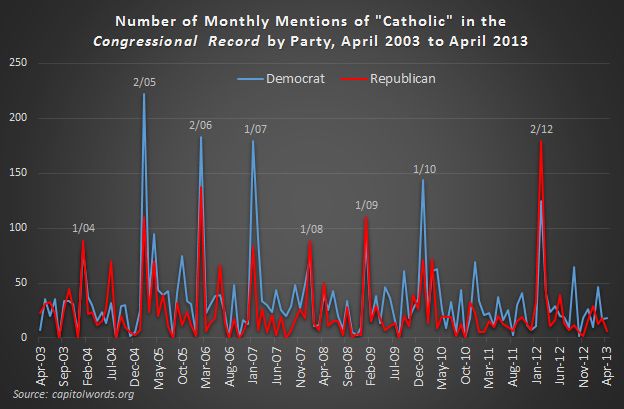Who Speaks More "Catholic" in Congress?
5.06.2013
Who talks the most about "Catholic" things in Congress? According to Capitol Words, since 1996, no one has mentioned that word more often "on the record" than Rep. Dennis Kucinich, Democrat from Ohio (in the House of Representatives since 1997, Kucinich's final term ended in January and is now a analyst for Fox News). Other Democrats using the word often in the Congressional Record include Rep. Daniel Lipinski (D-IL), Rep. Marcy Kaptur (D-OH), and House Minority Leader Nancy Pelosi (D-CA). Since April 2003, Democrats have averaged 34 references to something "Catholic" per month in Congress. In 84 of the 121 months (69%) that have passed since Democrats have mentioned "Catholic" more often than Republicans. On average, Republicans have mentioned something Catholic 23 times per month. In all, Democrats have said "Catholic" in the Congressional Record 4,110 times since April 2003 and Republicans have said this 2,800 times. Since 1996, the Republicans using the term most often are Rep. Christopher Smith (R-NJ) and Speaker of the House John Boehner (R-OH).

As shown in the figure below, something Catholic is most likely to come up in either party in the months of January or February. One can search the Congressional Record and see that these references are often honoring a Catholic individual, parish, school, or charity (...one could also use this to explore the content and context of the speech using the word "Catholic" that could reveal much more. Obviously frequent use of the word is no proxy for what the Catholic faith actually stands for. Usage of the word could be positive, neutral, or negative toward the faith). It is the case that generally there have been more Catholic Democrats in Congress than Catholic Republicans in recent history (including the current session). Generally, members of Congress who self-identify as Catholic are more likely than those who do not to use this word in the Congressional Record. However, there are a few who self-identify with other faiths who have used the word often including Republican Frank Wolf (R-VA) and Democrat Sheila Jackson-Lee (D-TX).
The figure above shows the actual number of times "Catholic" appears in the Record. Capitol Words has a nifty interactive tool that allows one to see mentions of any word or phrase as a percentage of all words in the Record for a given month (...it works similar to Google's Ngram Viewer, which allows for searching of words or phrases in books by language since 1800). This site is a project of the Sunlight Foundation which seeks to provide more transparency to American government. In addition to looking at the usage of a single word one can compare the frequency of use of words or phrases. For example: God vs. secular, pro-life vs. pro-choice, or poor vs. middle class. This site is one of many I've seen released and/or used by others recently that utilize somewhat unconventional data in an accessible format. Also among these is the hedonmeter which uses Twitter to measure general happiness. Nate Silver's interactive graphic on demographics and presidential elections is fascinating and also deserves a look. I'm also a fan of this interactive graphic that allows one to geographically visualize America's housing market in the context of when homes were built.
In the past I have written about using Google Trends as a measure of general interest in things "Catholic" (Google Correlate also adds some important context). At the time some expressed doubts about the results. Since then this tool has been used to predict flu outbreaks and the stock market. I'm more sure than ever that it is measuring something important (and for now worrisome). Now even Facebook likes are being used to predict personal information and demographics (...can these be used to predict "Catholicity"?). Here at CARA we will continue to explore the world of "big data" and non-traditional data more generally (i.e., other than standard historical and demographic statistics, surveys, focus groups, or experiments) to see what it can reveal about the faith. It turns out you can even learn a bit about CARA by searching for it in the Congressional Record.
http://nineteensixty-four.blogspot.com/2013/05/who-speaks-more-catholic-in-congress.html
Nineteen Sixty-four is a research blog for the Center for Applied Research in the Apostolate (CARA) at Georgetown University edited by Mark M. Gray. CARA is a non-profit research center that conducts social scientific studies about the Catholic Church. Founded in 1964, CARA has three major dimensions to its mission: to increase the Catholic Church's self understanding; to serve the applied research needs of Church decision-makers; and to advance scholarly research on religion, particularly Catholicism. Follow CARA on Twitter at: caracatholic.
No wonder you have such interesting thoughts to share.